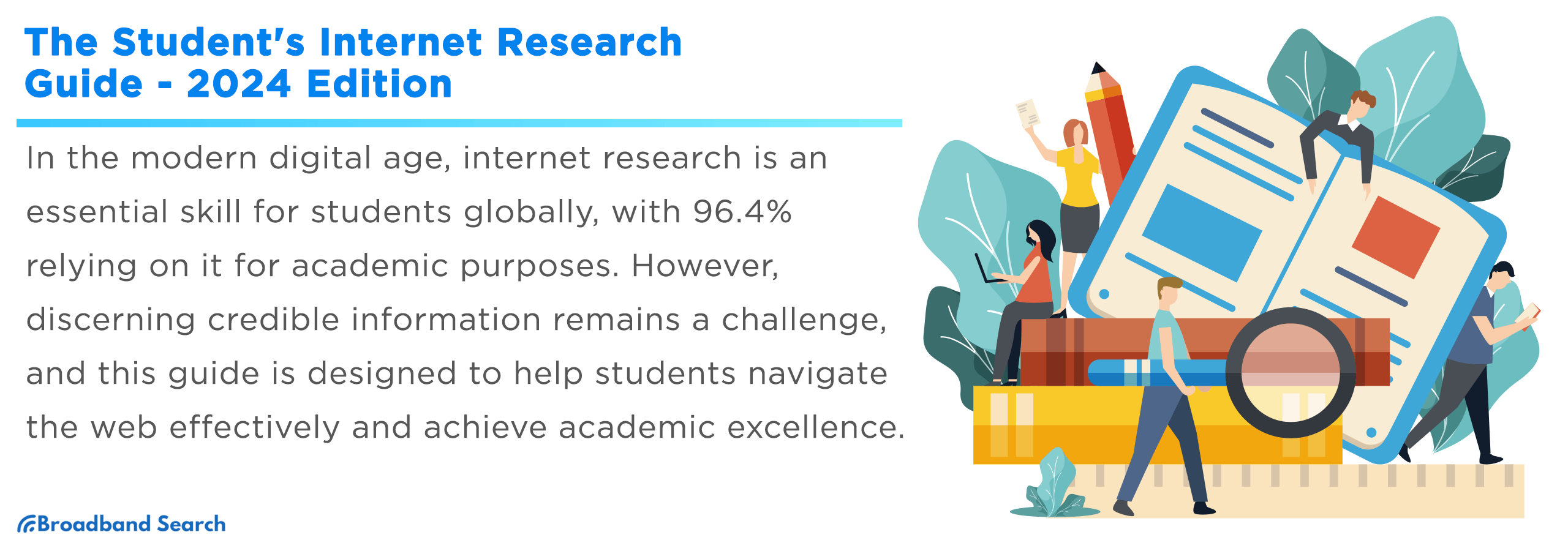In today's digital age, internet research stands as an indispensable skill for students worldwide. As Bill Gates once remarked, "The Internet is becoming the town square for the global village of tomorrow." Recent studies indicate that 96.4% of students rely on the internet for academic research, emphasizing its pivotal role in education.
However, while the vast expanse of the internet offers immense resources, discerning credible information remains a challenge. This guide aims to equip students with strategies to navigate and harness the web's potential, ensuring academic rigor and success.
Understanding Internet Research
Basics of Internet Research for Students
Internet research refers to the systematic process of seeking, collecting, and evaluating online information to draw meaningful conclusions or aid in decision-making. Its significance is underscored by the rich reservoir of data and perspectives it unlocks for students, granting them access to a universe of knowledge beyond traditional textbooks.
Types of Internet Research
- Academic Research: Primarily focuses on scholarly pursuits, involving the utilization of journals, educational databases, and official publications to procure credible and in-depth information pertaining to various subjects.
- Comparative Research: This involves juxtaposing various sources, opinions, or datasets available online. It aids students in developing analytical acumen, enabling a multifaceted understanding of topics through comparative analysis.
- Data-driven Research: Grounded in statistical exploration, this type leverages online databases, government publications, and credible organizations’ resources to obtain factual, quantitative information essential for objective analytical assignments.
The diligent use of internet research is directly proportional to academic success. A student's capacity to discern quality sources, synthesize varied information, and utilize it effectively in their academic pursuits is a testament to not just their research acumen but also their readiness for higher education and professional life.
Challenges in Online Research
As the digital landscape burgeons with information, the complexities of sourcing, interpreting, and leveraging this information grow in tandem. It's not just about finding data anymore; it's about finding the right data and understanding its context.
Key Challenges in Online Research:
- Information Overload: With billions of pages at our fingertips, filtering pertinent information can be overwhelming. One must skillfully use search operators and specialized databases to hone in on relevant content.
- Evaluation of Credible Sources: Not all information is created equal. According to a report from the Stanford History Education Group, many students struggle to evaluate the reliability and credibility of online sources. It's essential to scrutinize the authority, accuracy, and objectivity of any source.
- Spotting Red Flags: The web is rife with skewed perspectives, intentionally false data, and biased content. Recognizing these pitfalls is a critical skill to prevent being misled.
- Avoiding Plagiarism: Directly lifting content from the web without proper attribution is not only unethical but can have serious academic and professional repercussions. Platforms like Turnitin and Copyscape have become essential tools to ensure originality.
The challenges of internet research are manifold, but with the right strategies and a discerning approach, one can transform these challenges into opportunities for enriched understanding.
Starting Your Research
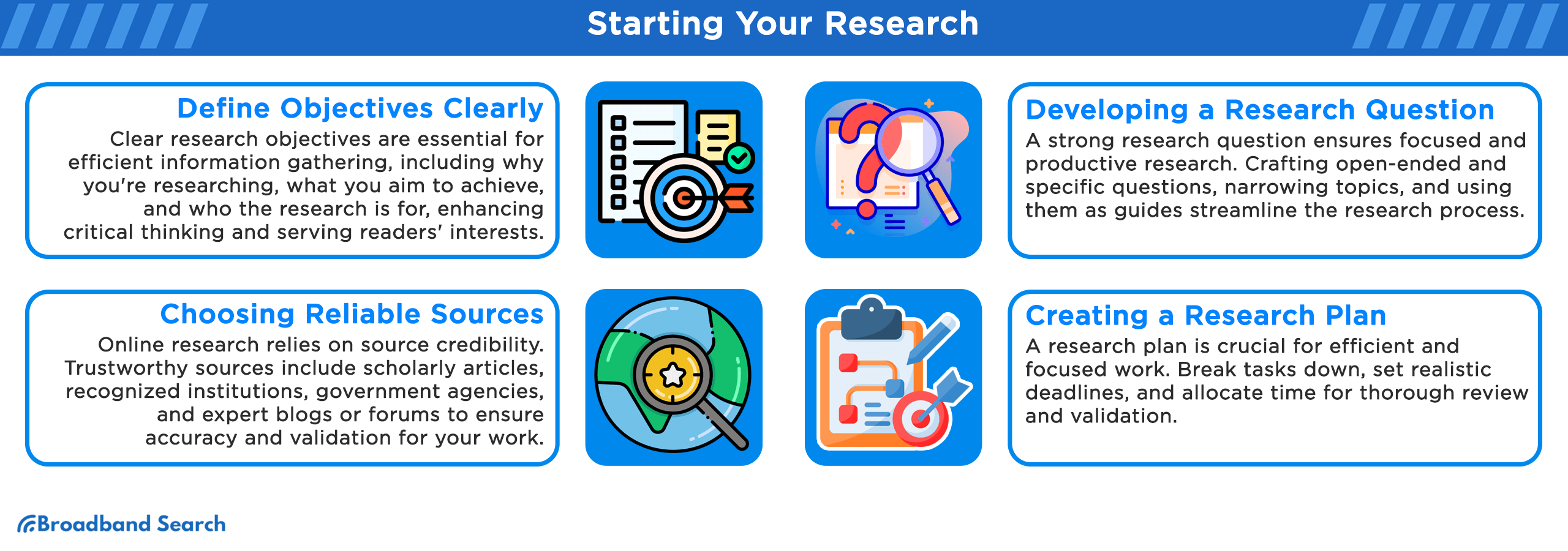
Define Objectives Clearly
Embarking on a research journey without a clear map can lead to wandering aimlessly in the vast ocean of information that the internet presents.
Starting your research rightly not only sharpens your focus but also streamlines the process, ensuring efficiency and accuracy. The fundamental step in this endeavor is to define the research objectives with clarity, acting as a guiding light throughout your journey.
- Purpose: The primary step in any research journey. It's about answering the 'why' of the research. What is the main goal? Whether it's understanding consumer behavior, exploring a historical event, or gauging the impact of a technological advancement, the purpose sets the tone and direction.
- Achievement: This answers the 'what' of the research. What milestones need to be reached? It can be gathering specific data, drawing certain insights, or producing a comprehensive report.
- Target Audience: Knowing the 'who' can shape the 'how' of research. Is the research intended for academics, businesses, policymakers, or general audiences? Tailoring the research to the needs and preferences of the intended audience ensures its relevance and usability.
Efficient research leads to well-informed arguments, fosters critical thinking, and elevates the quality of academic output. Moreover, by serving the genuine interests of its readers, the research becomes a beacon of knowledge, contributing significantly to the academic community and beyond.
Choosing Reliable Sources
In online research, source credibility is crucial to maintain integrity. Choosing reliable sources ensures accuracy and validates your work to critical readers, as scholarly work depends on trustworthy sources.
- Scholarly Articles: Peer-reviewed journals and publications are gold standards in research. They undergo rigorous evaluation by experts in the field, ensuring accuracy and credibility. Sources like Google Scholar or JSTOR can be invaluable.
- Recognized Institutions: Universities, research centers, and professional organizations often publish studies, papers, and reports. Their reputation hinges on the quality of information they disseminate, making them trustworthy sources.
- Government Agencies: Government publications, statistics, and reports are typically well-researched and factual. Websites with domains ending in '.gov' or similar official extensions indicate authentic government-associated resources.
- Expert Blogs and Forums: While they may lack the formal scrutiny of academic journals, expert-authored blogs or niche forums can offer insights, especially on contemporary or emerging topics. However, they always cross-reference their claims with established sources.
Developing a Research Question
The essence of fruitful research often lies in the strength of the question that guides it. A well-phrased research question not only provides clarity but also ensures that your exploratory journey remains productive, purposeful, and focused.
Crafting Questions
Forming open-ended and focused questions is crucial. While open-ended questions such as "What are the impacts of social media on mental health?" provide a broader perspective, focused questions like "How does social media usage among teenagers in the US correlate with anxiety levels?" delve into specifics, ensuring depth in research.
Focused Topics
A research project's success often hinges on the specificity of its subject matter. Instead of attempting to cover the vast expanse of a topic like "The history of art," narrowing it down to "The influence of Renaissance art on modern graphic design" can provide more actionable insights and allow for a thorough exploration.
Guided Search
A well-constructed research question is a researcher's compass. For instance, if one were to investigate the "Economic impact of the 2008 financial crisis on small businesses in New York," search engines and databases can be used more effectively to filter relevant studies, articles, and data pertaining to that precise topic, making the process efficient.
The art of formulating a research question is a blend of curiosity and precision. In an age where the internet offers an overwhelming abundance of information, the ability to ask the right questions is the key to unlocking valuable insights.
Creating a Research Plan
Crafting a research plan offers a blueprint, illuminating each step of the process and ensuring efficiency and direction. Given the sea of information available online, this blueprint becomes especially pivotal in maximizing productivity and maintaining focus.
Task Breakdown
Deconstructing your research into granular tasks and steps ensures a systematic approach. For instance, researching the impact of AI in healthcare can be broken down into tasks like "Study AI algorithms," "Analyze AI applications in diagnostics," and "Evaluate AI's role in patient management."
Realistic Deadlines
Establishing a timeline fosters accountability and pace. If you're researching for a 10-page paper on "Sustainable Energy Solutions for Urban Areas" due in a month, you might allocate the first week for background reading, the next two for detailed research, and the final week for drafting and refining.
Review Time
No research is complete without thorough revision and validation. Setting aside ample time to revisit gathered information ensures accuracy and comprehensiveness. For a topic like "Blockchain in Financial Transactions," after accumulating data and drafting initial findings, dedicating a few days to validate sources, cross-check facts, and tighten arguments can make all the difference.
Developing Effective Research Strategies
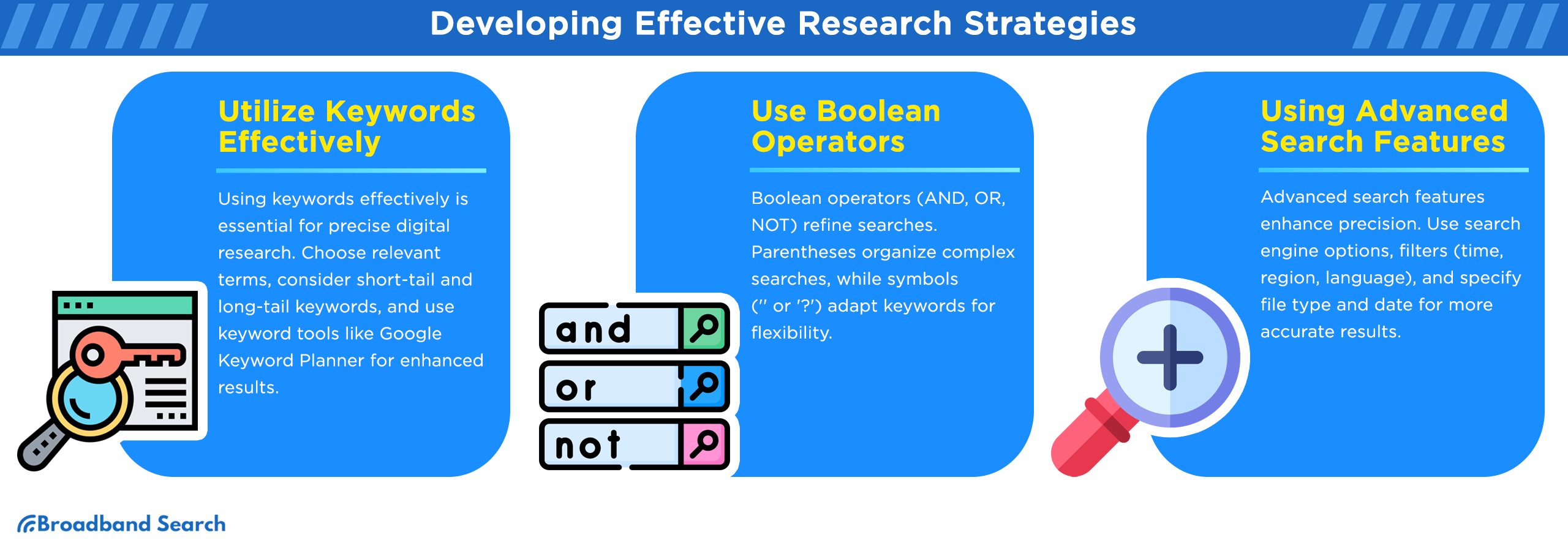
Utilizing Keywords Effectively
Keywords are crucial in digital research because they help filter and find relevant information in a vast digital archive. Using keywords effectively is not just about searching well; it's about getting precise and in-depth results in an age of information overload.
Relevant Keywords
Central to any search process, understanding and selecting appropriate search terms is paramount. For instance, while researching the "Impact of climate change on marine life," terms like "ocean acidification," "coral bleaching," and "sea temperature rise" can hone in on niche topics within the broader subject.
Long-tail vs Short-tail
Short-tail keywords, like "climate change," provide a broader scope, ideal for an initial exploratory phase. In contrast, long-tail keywords, such as "effects of climate change on Antarctic penguins," offer a narrow, in-depth perspective, beneficial for detailed investigations.
Keyword Tools
While search engines are powerful, tools like Google Keyword Planner can elevate the search experience. It provides keyword suggestions, search volume data, and competitive insights. Alternatives such as SEMrush or Ahrefs' Keywords Explorer can offer expanded functionalities, catering to diverse research needs.
Boolean Operators
Boolean operators act as a refined toolkit, enabling scholars to navigate vast datasets with surgical precision. Mastering these operators transforms searches from simple queries into strategic endeavors, streamlining access to desired content.
Using AND, OR, NOT
The Boolean operators AND, OR, NOT are the guardians of search relevance. Using "AND" unites terms, narrowing results (e.g., cats AND dogs). "OR" broadens searches by embracing multiple terms (e.g., cats OR dogs), while "NOT" excludes unrelated information (e.g., cats NOT lions).
Nested Searches
Parentheses breathe structure into complex searches. They help manage the chaos, allowing for intricate combinations of terms and operators, thus sharpening the sword of specificity. For example, using parentheses in a search like (cats OR dogs) AND (pets OR animals) refines and organizes the onslaught of information.
Truncation and Wildcards
Symbols like '' or '?' are the allies of adaptability in search queries, allowing for variations of keywords to be included. Truncation (e.g., teach) would embrace 'teacher', 'teaching', or 'teachable', while wildcards (e.g., wom?n) allow for flexibility, capturing terms like 'woman' or 'women'.
Using Advanced Search Features
Advanced search functionalities, often underutilized, are akin to a master key, unlocking doors to refined results. Their adept use can streamline the research process, bringing accuracy and efficiency to the forefront.
- Search Engine Features: Leverage specialized functionalities such as Google’s "verbatim" or "similar" searches to cultivate richer, more precise results. These features, when adeptly utilized, transform generic searches into focused, purpose-driven queries, offering a gateway to more relevant information.
- Filters: Applying filters like "time," "region," or "language," elevates the specificity of search outcomes. For instance, filtering news articles to display results from the past week can significantly refine the timeliness and relevance of the information retrieved, ensuring it aligns more closely with current trends or discussions.
- File Type and Date: Direct your search towards specific document types such as PDFs or PowerPoint presentations, or focus on publication dates to ensure the relevance of sourced materials. For example, seeking academic research papers published in the last two years and filtering for PDF file types can help locate the most recent scholarly discussions available in a ready-to-use format.
Evaluating Online Sources
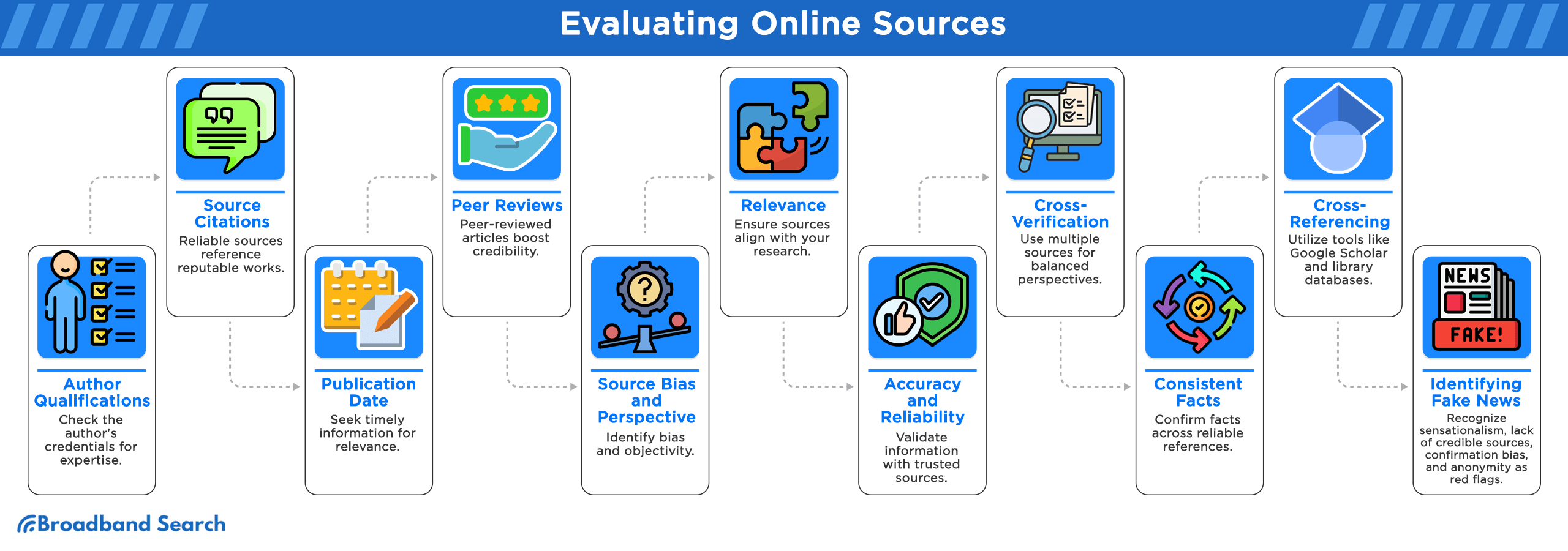
Criteria for Assessing Source Credibility
The credibility of sources shapes the foundation upon which our knowledge and arguments stand. But how do we differentiate the trustworthy from the deceptive? The following criteria offer a guiding light.
- Author Qualifications: A discerning eye towards the author's credentials is fundamental. For instance, a scientific article authored by a Ph.D. holder with expertise in the relevant field carries more weight, ensuring that the content is steeped in knowledge and experience.
- Source Citations: The robustness of a source is often reflected in its citations. A well-sourced article, referencing reputable and relevant works, stands as a pillar of reliability. For example, a health-related article citing recent medical journals demonstrates a strong foundation.
- Publication Date: Timeliness is key. An article on technology trends from a reputable source but dated five years ago may not contribute valuable, up-to-date insights. It's imperative to seek information that echoes the current state of knowledge or developments.
- Peer Reviews: In academic circles, peer-reviewed articles are golden standards. They undergo rigorous scrutiny, ensuring that the research presented is sound and validated by experts. For instance, in scientific research, journals like "Nature" and "Science" are esteemed for their peer-review process, bolstering the credibility of their publications.
Meticulous evaluation using these criteria doesn't just elevate the quality of research; it ensures integrity, fostering trustworthiness and excellence.
Understanding Source Bias and Perspective
In the age of information, discerning the neutrality of online content is paramount. As every source carries its undertones, identifying bias and recognizing objectivity becomes the linchpin of credible research.
Bias/Objectivity
Content often mirrors the perspective of its creator. For instance, a tech review may lean favorably towards a product if sponsored by its manufacturer, while independent reviewers might provide a more balanced assessment. Hence, researchers should cross-reference multiple sources, ensuring a holistic understanding devoid of undue influence.
Relevance to Your Topic
Ensure the source directly addresses your research query. For example, a study focusing on the impacts of social media on mental health is pertinent when researching mental wellness trends among teenagers in the digital age. This focused approach promotes relevant and valuable insights, bolstering the integrity of your research outcomes.
Accuracy and Reliability
Always validate the trustworthiness of information. For instance, a claim stating "93% of global youth use social media daily" should be corroborated with reputable datasets or studies, such as those from Pew Research Center. Such a rigorous approach filters out discrepancies, ensuring research is rooted in undeniable facts.
Cross-Verification Techniques
Cross-verification stands as a researcher's sentinel, ensuring online information withstands scrutiny and consistently aligns with multiple trusted sources, thereby cultivating a garden of genuinely insightful and trustworthy knowledge.
Multiple Sources
The key to a well-rounded perspective lies in comparing information from various reliable sources.
- When researching climate change, cross-referencing data from the IPCC (Intergovernmental Panel on Climate Change), NASA, and NOAA (National Oceanic and Atmospheric Administration) ensures a comprehensive view.
- For political analysis, combining insights from The New York Times, The Guardian, BBC, and Al Jazeera offers a balanced outlook.
- In health research, verifying findings from the World Health Organization (WHO), CDC (Centers for Disease Control and Prevention), and respected medical journals reinforces credibility.
- Exploring tech trends becomes more insightful when data from MIT Technology Review, Wired, Forbes, BroadbandSearch and TechCrunch converge, providing multifaceted perspectives.
Consistent Facts
One of the cornerstones of evaluating online sources is identifying consistent facts across multiple reputable references. For instance, in researching the health benefits of a particular diet, cross-referencing sources like Mayo Clinic and Harvard Medical School can validate consistent claims about its positive impacts. This verification approach strengthens the credibility of the information and minimizes the influence of bias, fostering more reliable research outcomes.
Cross-referencing
Efficient cross-referencing is a key element in source evaluation, empowering researchers to navigate the digital landscape with precision. Utilizing specialized tools and strategies ensures accuracy and minimizes the influence of bias.
- Google Scholar: An invaluable resource for academics, it allows users to explore academic papers, patents, and legal opinions across multiple disciplines, aiding in thorough source comparison.
- Library Databases: University libraries often offer access to databases like JSTOR, facilitating cross-referencing across peer-reviewed journals.
- Fact-checking Websites: Platforms like Snopes or FactCheck.org verify claims, helping researchers debunk or substantiate information.
- Media Bias/Fact Check: This online resource rates news outlets on their bias and credibility, offering insights into the reliability of news sources.
Identifying Fake News and Misinformation
Spotting characteristics of misleading content misinformation and fake news are rampant online, threatening to erode trust in information sources. Understanding their common characteristics is essential:
- Sensationalism: Content with exaggerated claims or alarmist language, such as "Groundbreaking Cure Found for All Diseases!" often aims to evoke strong emotions, leading to uncritical acceptance.
- Lack of Credible Sources: Misleading information often lacks reputable references, making it challenging to verify claims. For example, an article claiming a new scientific discovery without citing any scientific journals or experts.
- Confirmation Bias: Misinformation often reinforces existing beliefs or prejudices, resonating with preconceived notions. This bias can cloud critical judgment, as individuals are more inclined to accept information that aligns with their beliefs.
- Anonymity or Pseudonymity: Sources that conceal the identity of authors or organizations may raise suspicion. Misinformation can thrive in the shadows, as accountability is often absent.
By recognizing these characteristics, individuals can become more adept at evaluating online sources and safeguarding themselves against the spread of misinformation.
Managing and Organizing Information
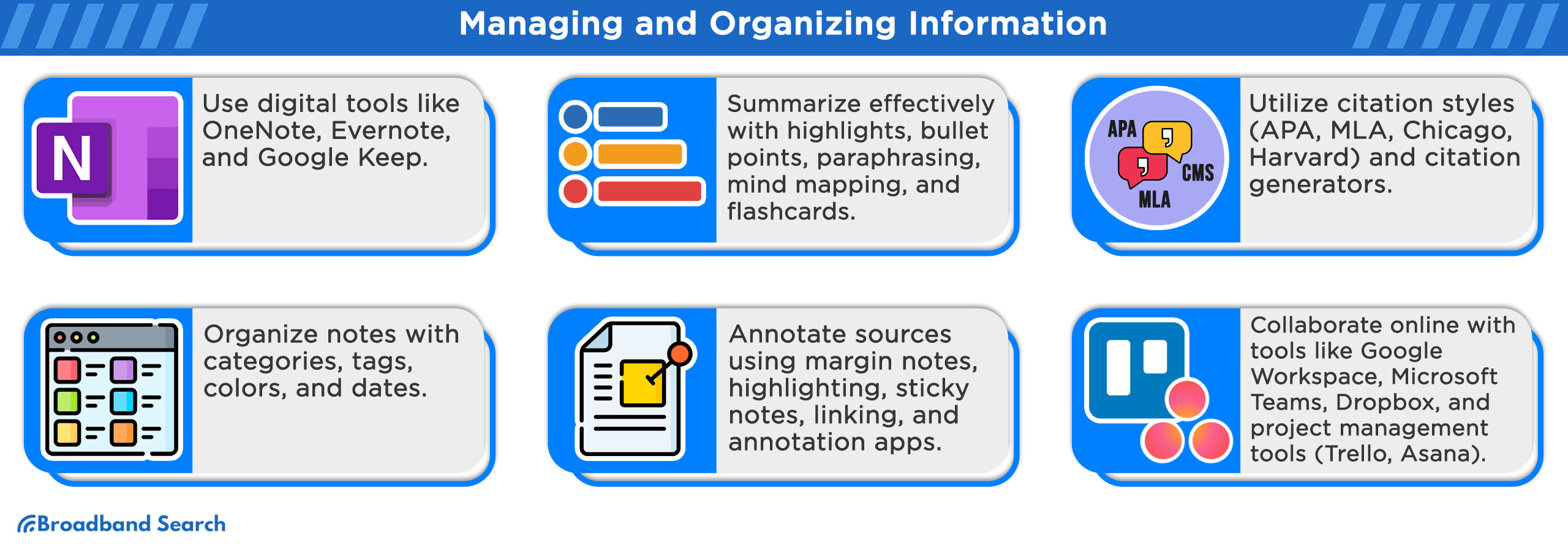
Effective Note-taking Strategies
Effective note-taking is a superpower. It's the compass that guides us through the mystery of knowledge, helping us capture insights, facilitate learning, and stay organized.
Digital Tools for Note-taking
Digital note-taking tools have revolutionized the way we capture and organize information. Discover how these versatile tools, like OneNote, Evernote, and Google Keep, empower users to streamline note-taking, enhance productivity, and effortlessly manage digital information, making them essential assets in the digital age.
- OneNote: Microsoft's OneNote is a versatile digital notebook that seamlessly integrates with other Microsoft apps. Users can create notebooks, organize notes into sections, and incorporate multimedia content. For instance, students can create dedicated notebooks for different subjects, enhancing study efficiency.
- Evernote: Evernote is a cross-platform note-taking app that excels in organization. It offers features like notebooks, tags, and a powerful search function. Business professionals can use Evernote to collate meeting notes, research, and ideas, streamlining workflow.
- Google Keep: Google Keep is a user-friendly, cloud-based note-taking app ideal for quick, accessible notes. Its integration with Google Workspace enhances collaboration. For instance, teams can use Google Keep to brainstorm ideas, create to-do lists, and share them seamlessly.
Strategies for Organizing Notes Effectively
Effective note-taking isn't just about jotting down information; it's about organizing it systematically:
- Create Categories: Organize notes by themes or subjects. For instance, a student can categorize biology notes into subtopics like "Cell Structure" or "Genetics."
- Use Tags: Apply descriptive tags to notes. In a work setting, tags like "Meeting Minutes" or "Project Updates" help quick retrieval.
- Color Coding: Assign colors to categories or priorities. For example, in a to-do list, urgent tasks can be highlighted in red.
- Date Stamping: Always date your notes. This practice aids in tracking the timeline of events or progress on projects.
- Table of Contents: Create a summary or table of contents for longer documents, facilitating quick navigation within extensive notes.
Effective Summarizing Techniques
Efficient summarizing techniques are essential for distilling complex information into concise, comprehensible notes:
- Highlight Key Points: Identify and underline the most important details within your notes to create a quick reference.
- Use Bullet Points: Condense information into bullet points, simplifying content while retaining crucial data.
- Paraphrase Succinctly: Rewrite information in your own words, ensuring clarity without losing the essence of the content.
- Mind Mapping: Visualize relationships between ideas with mind maps, aiding in grasping concepts holistically.
- Create Flashcards: Summarize key facts or concepts on flashcards for efficient revision and memorization.
Annotating Sources
Annotating sources enhances note-taking efficiency and comprehension:
- Margin Notes: Jot down key insights and thoughts directly in the margins of physical texts or PDFs, providing context and quick reference.
- Highlighting and Underlining: Use colors to emphasize essential information within texts, aiding later review and understanding.
- Sticky Notes: Digital sticky notes in applications like Adobe Acrobat or Microsoft Edge enable you to add comments, questions, or insights to specific pages.
- Linking to Notes: Create hyperlinks between notes and related source materials, facilitating seamless navigation and cross-referencing.
- Commenting and Annotating Apps: Apps like Notability and GoodNotes allow for in-depth annotations, including handwriting, diagrams, and multimedia, transforming notes into comprehensive resources.
Citation Styles
Citation styles are the unsung heroes of research, ensuring that credit is given where it's due and lending credibility to academic and professional work.
APA, MLA, Chicago, and Harvard
- APA (American Psychological Association): Predominantly used in social sciences and education, APA focuses on clarity, conciseness, and precision in citation. Example: "Smith, J. (2019). The Impact of Social Media on Adolescents."
- MLA (Modern Language Association): Commonly used in humanities, arts, and literature, MLA emphasizes author-page format for in-text citations. Example: "(Smith 22)."
- Chicago (Chicago Manual of Style): Adopted in history, arts, and social sciences, Chicago offers two styles—author-date and notes-bibliography. Example (Notes-Bibliography): Smith, John. "The Chicago Skyline." In Chicago: A Visual Journey, 2019, 45-60.
- Harvard: Widely used in various disciplines, Harvard employs author-date citations, prioritizing accessibility. Example: "(Smith 2019) "The Impact of Climate Change on Agriculture."
Citation Generators
Citation generators are invaluable aids in maintaining the accuracy and consistency of citations. Here are a few reliable tools and their correct usage:
- Citation Machine: A user-friendly tool that generates citations in various styles, from APA and MLA to Chicago and Harvard. Simply enter the source information, and it formats it correctly. This is ideal for students and researchers looking for a hassle-free experience.
- Zotero: A robust tool for collecting, organizing, and citing research materials. It seamlessly integrates with your browser to save sources and generate citations. Perfect for scholars managing extensive references.
- Mendeley: A reference manager and academic social network that assists in generating citations, creating bibliographies, and collaborating with peers. It's favored by researchers who want an all-in-one solution.
- EndNote: A comprehensive citation management software often used in research institutions, EndNote offers advanced features for organizing and citing sources. It's particularly useful for large-scale research projects.
These tools save time and ensure accurate citations, reducing the risk of errors in academic and professional work.
Collaborating with Peers Online
Online collaboration has become an indispensable tool for individuals and teams seeking to work together efficiently, regardless of geographical boundaries.
Leveraging Collaboration Tools
Google Workspace and Microsoft Teams offer real-time document editing and communication features, streamlining collaborative work for teams worldwide. Google Workspace allows seamless collaboration on documents, spreadsheets, and presentations, fostering productivity and teamwork. Meanwhile, Microsoft Teams facilitates secure online meetings and file sharing, making it ideal for remote collaboration.
Sharing Resources and Insights Effectively and Securely
With secure cloud storage and file-sharing platforms like Dropbox or SharePoint, you can easily distribute and access resources while maintaining data security. For instance, Dropbox Business provides secure file storage and sharing, ensuring efficient collaboration without compromising data integrity.
Coordinating and Managing Group Research Projects Online
Tools like Trello or Asana enable teams to manage projects efficiently. For example, Trello offers a visual project management approach with boards, lists, and cards, making it simple to assign tasks, track progress, and collaborate effectively on research projects.
These strategies empower you to collaborate seamlessly, sharing resources and knowledge while maintaining security and efficiency in an increasingly digital workspace.
Advanced Research Tools
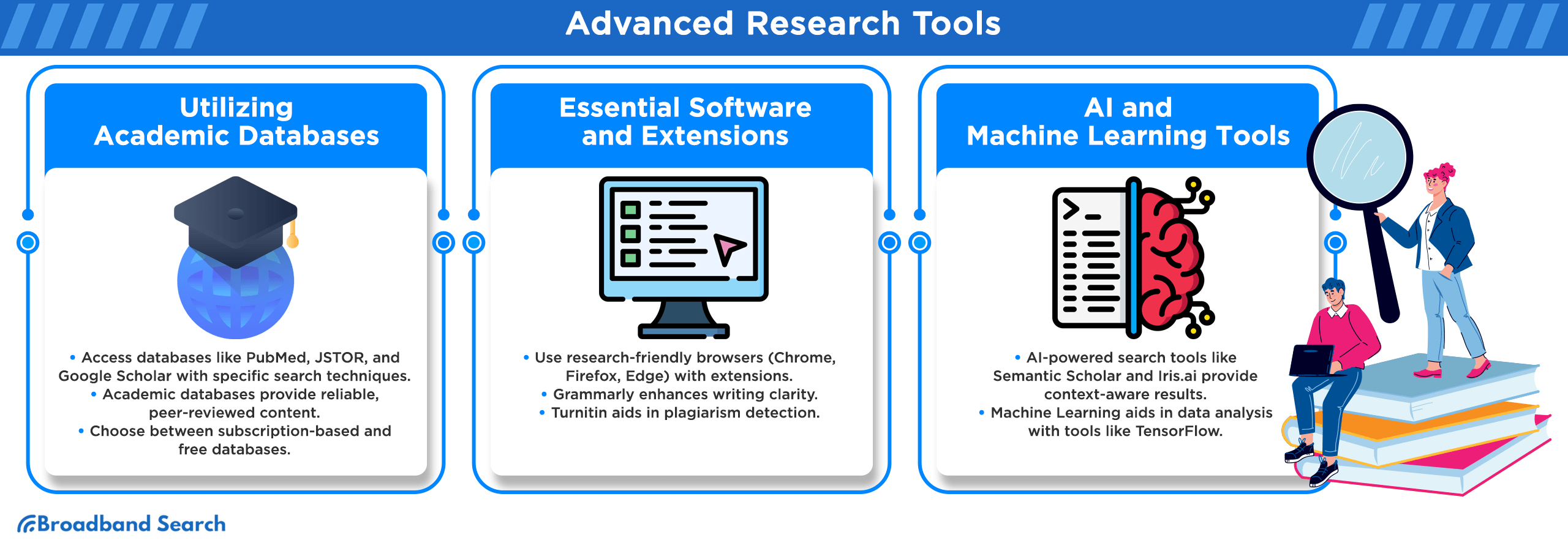
Utilizing Academic Databases
Knowledge is power, and academic databases stand as digital treasure troves, offering access to a wealth of scholarly resources and research materials.
Access Methods
Navigating databases like PubMed, JSTOR, and Google Scholar involves utilizing specific search queries, filters, and advanced search options to unearth precise scholarly content.
Database Benefits
Academic databases offer curated, peer-reviewed content, ensuring the accuracy and reliability of research materials. In contrast, standard search engines may yield less credible sources, making databases indispensable for academic and professional research.
Subscription vs. Free
Subscription-based databases like ProQuest provide extensive collections of academic resources, while free databases like DOAJ (Directory of Open Access Journals) offer open-access content. Subscription databases often grant access to premium research journals and archives, while free databases promote open knowledge sharing.
Essential Software and Extensions
Specialized software and browser extensions have become indispensable assets for researchers, amplifying productivity and information retrieval.
- Research-friendly Browsers (Chrome, Firefox, Edge): These browsers offer a multitude of extensions and plugins designed to enhance research, from reference management tools to PDF annotators. For example, the Zotero extension for Firefox allows seamless citation management and reference organization.
- Grammarly: Beyond correcting grammar, Grammarly analyzes context, offering suggestions for writing clarity and correctness. Whether you're composing an academic paper or a professional email, Grammarly ensures your message is precise and polished.
- Turnitin: An essential tool for academia, Turnitin aids in plagiarism detection and prevention. It scans documents for similarities with an extensive database of academic content, ensuring the originality and integrity of research papers.
AI and Machine Learning Tools
Artificial Intelligence and Machine Learning tools are revolutionizing research by analyzing vast datasets, predicting trends, and automating tasks, empowering researchers with unparalleled insights and efficiency.
AI-Powered Search
Tools like Semantic Scholar employ AI to provide relevant, context-aware search results, helping researchers discover articles, journals, and studies tailored to their interests. For instance, Iris.ai employs natural language processing to understand research papers and generate connections between them and Citeulike's AI-driven recommendations enhance academic discovery.
Machine Learning for Data Analysis
Machine Learning algorithms enable researchers to identify intricate patterns in vast datasets, aiding in fields like genomics and climate modeling. Example: TensorFlow, used for natural language processing in sentiment analysis.
AI Applications
AI-driven tools like IBM Watson and GPT-4 assist researchers in automating tasks, from literature reviews to data extraction, improving research efficiency and accuracy. Watson Discovery offers AI-driven data insights, while GPT-3 generates human-like text.
Ethical Considerations in Online Research
Respecting Copyright Laws
Maintaining ethical standards in online research involves respecting copyright laws, acknowledging the importance of intellectual property, and seeking permission when using others' work to ensure a responsible and lawful online research practice.
Overview of Copyright, Fair Use, and Public Domain
Copyright laws grant creators exclusive rights to their work, but fair use exceptions exist for purposes like education and commentary. Materials in the public domain can be freely used. For instance, a public domain image can be used without restrictions.
Guidelines for Using Images, Videos, and Text from the Internet
When using online content, ensure proper attribution, adhere to usage restrictions, and obtain permissions when necessary.
- Pixabay: Offers high-quality images and videos for free use.
- Unsplash: Provides a vast collection of professional photos.
- Pexels: Features free stock photos and videos.
- Flickr Commons: Offers historical images and cultural heritage content.
Ethical Use of Data and Privacy Considerations
Respecting data privacy and ethical data use are imperative in online research, safeguarding individuals' rights and ensuring responsible research practices.
Implications of Using Sensitive Data
Researchers must comprehend the legal and ethical consequences of handling sensitive or private data, especially in healthcare or financial studies, to protect participants and avoid data breaches. Comply with laws like the General Data Protection Regulation (GDPR) when handling personal data. For instance, GDPR ensures the lawful and transparent processing of individuals' data.
Respecting Participants’ Privacy and Confidentiality
Informed consent, anonymization, and secure data storage are crucial. Research ethics boards and organizations like the American Psychological Association (APA) provide guidelines. For example, in medical research, patient data should be de-identified to protect confidentiality.
Following Ethical Guidelines for Data Handling
Platforms like Institutional Review Boards (IRBs) and journals have specific ethical standards for research data. In social sciences, researchers must gain consent, store data securely, and follow ethical guidelines during analysis and publication.
Engaging with Online Communities Ethically
Engaging with online communities ethically entails respecting their norms, privacy, and trust. It involves upholding the principles of informed consent and ensuring that the research contributes positively to the community.
Participating Responsibly in Online Forums and Groups
Uphold respectful and responsible conduct when engaging in online communities such as Reddit, Quora, and Stack Exchange. Respect community norms, obtain consent if necessary, and avoid spamming or self-promotion.
Understanding the Implications of Misinformation and Disinformation
Misinformation and disinformation have profound societal impacts. Recognizing their consequences helps researchers address these issues effectively, as highlighted by studies conducted by organizations like the Pew Research Center.
Avoiding and Addressing Cyberbullying and Harassment
Online harassment is a growing concern. Referencing recent statistics from platforms like Twitter or academic research on online harassment trends can shed light on the prevalence and strategies for addressing this issue.
The Takeaway
In the realm of academia, mastering the art of internet research is akin to unlocking a treasure trove of knowledge. Throughout this comprehensive guide, we've navigated through the essential principles of internet research, from formulating precise research questions to employing advanced research tools. We've explored ethical considerations, source evaluation, note-taking strategies, and the ethical use of data, equipping students with a robust skill set to excel in their academic journeys.
As students, your capacity for growth is boundless. Embrace internet research as a lifelong skill, an ever-evolving art that can open doors to new discoveries and insights. In a world brimming with information, your ability to discern, evaluate, and synthesize knowledge will set you apart.
So, here's the call to action: embark on your research endeavors with confidence, apply the techniques learned, and approach each quest for knowledge with curiosity and critical thinking. As you do, you not only enhance your academic prowess but also contribute to the broader culture of continuous learning and intellectual advancement. Your journey as a researcher has just begun; the virtual library of the internet awaits your exploration, so keep learning, keep growing, and keep researching.
FAQ
Can I rely solely on open-source information for my research?
Open-source information can be valuable, but it's essential to diversify your sources. Depending on your topic, you may need peer-reviewed articles, data from academic databases, or expert insights not readily available in open sources.
What role do social media platforms play in research?
Social media can be a resource for real-time data and discussions, but it should complement, not replace, traditional sources. Use it cautiously, considering issues like bias and privacy, and cite social media posts properly in academic work.
Is it necessary to pay for academic databases when much information is available for free?
Paid academic databases offer access to extensive, peer-reviewed content critical for in-depth research. While free sources are valuable, consider the depth and quality of information required for your study when deciding.
How can I improve my research efficiency without compromising on the quality of information?
Enhance research efficiency by refining your search queries, using advanced search tools, and organizing sources effectively. Prioritize sources based on credibility, relevance, and recency to streamline your research process.
What steps can I take if I cannot find information on my research topic?
If information is scarce, broaden your search terms, explore related fields, or consult with experts. Additionally, consider adjusting your research question or exploring unconventional sources for insights.

